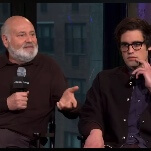Mike Sacks’ And Here’s The Kicker
After devouring And Here’s The Kicker: Conversations With 21 Top Humor Writers On Their Craft, a compulsively readable dissection of the comic mind by Vanity Fair staffer Mike Sacks, I want to give its author the highest praise any writer can give another: His book made me insanely fucking jealous, and not just because he’s kicking ass on Amazon.
Sacks has written a book I wanted to write myself. Even more unforgivably, he’s done a better job than I probably would have. A few years back, I thought about writing a book of interviews about the craft of comedy to be called Dying Is Easy. (As in, “but comedy is hard.”) Like many of my ideas, it never made it past the daydreaming stage.
I’ve always found the creative process fascinating, especially where comedy is concerned. But I wondered whether delving deep into the mechanics of comedy would be edifying or tedious. Would traveling deep inside the comic mind be a Willie Wonka & The Chocolate Factory-like journey through a wondrous and fantastical sphere, or a dispiriting field trip to the hot-dog factory? Does analyzing comedy drain the joy out of it?
Kicker answers that last question with a defiant, “Oh God no, Fuckface.” One of the many things I loved about Kicker is its A.V. Club sensibility. Back in the day, The A.V. Club interviewed a lot of obscure/random folks because we didn’t have access to big names. This worked out well, as Mr. T and Herschell Gordon Lewis had a lot more to say than the hot actress of the day. Similarly, Sacks didn’t get Stephen Colbert or Sacha Baron Cohen or David Letterman or Ricky Gervais to spend five hours delving deep into their work, but he did snag Colbert Report producer Allison Silverman, longtime Cohen collaborator Dan Mazer, Letterman writer Merrill Markoe, and Gervais partner Stephen Merchant. Silverman, Mazer, Markoe, and Merchant deliver fascinating insights into the methods and processes of Colbert, Cohen, Letterman, and Gervais respectively.
I knew of Markoe by reputation, but after reading Kicker, I feel like I’ve spent a few hours picking her brain over dinner. In one of my favorite passages, Markoe says she was attracted to Letterman—her longtime boyfriend—in no small part because she was impressed by his choice of nouns. How fucking beautiful is that? Is there anything more geekily romantic than word-selection-based mating? The interviews have a casual intimacy that’s enormously winning. Sacks (who, full disclosure, interviewed me for an upcoming Vanity Fair online piece), followed Jack Paar’s advice to a young Dick Cavett: “Kid, don’t make it an interview. Interviews have clipboards, and you're like David Frost. Make it a conversation.” Appropriately enough, Sacks gets some great stuff out of his freewheeling conversation with Dick Cavett, from an anecdote about being on a dinner date with Marlon Brando, and getting propositioned by a woman eager to be the meat in a Dick Cavett/Marlon Brando sex sandwich (incidentally, Dick Cavett Marlon Brando Sex Sandwich is so going to be the name of my new ska band) to a blackly comic story about a guest—a health buff, no less—who literally dropped dead of a heart attack while Cavett was interviewing him.
As with Markoe, I knew M*A*S*H creator Larry Gelbart only by reputation, as a respected comedy veteran. Now I feel like I know him as a writer and a man. In fact, I kind of want him to be my grandfather. Gelbart gets one of the book’s best and most surprising lines when he argues that what comedy is really missing these days is Judaism. That’s like saying the NBA desperately lacks tall black men, and musical theater is in dire need of gay men. Gelbart says comedy has lost the scruffy underdog vitality Jews historically brought to it, that it’s become too whitebread and WASPy. I don’t agree with him at all. In my mind, Jewish comedy is American comedy; it’s had such an enormous effect on the mainstream that it almost doesn’t make sense to delineate between Jewish and non-Jewish comedy. But it takes balls to decry the lack of Judaism in comedy. Now that I think about it, what comedy is really missing is Harvard Lampoon alumni. When are those guys finally going to make their presence felt?
The greatest of Sacks’ finds is Irving Brecher, an ancient, now-deceased old fogey who wrote for Bob Hope and the Marx brothers while barely old enough to shave. In a perfect world, Brecher would be treated like an American treasure. Journalists would line up to pick his brain and mine the wisdom and experience he’s accrued. In this imperfect world, we’re lucky Sacks took advantage of his decades of juicy anecdotes while there was still time.
It would be easy for interviews about the craft of comedy to come off as dry or academic; Kicker is anything but. These are funny fucking people. An unspoken spirit of friendly competition and one-upmanship courses through these interviews: Nobody wanted to be the stiff of the bunch, especially in such distinguished company. So Kicker is filled with exchanges that linger in the mind. Here’s my favorite, from an interview with Mad Magazine fold-in guru Al Jaffee:
Sacks: Was there a sense of camaraderie in the golden age of Mad, say from the early sixties through the mid-seventies?























![HBO teases new Euphoria, Larry David, and much more in 2026 sizzle reel [Updated]](https://img.pastemagazine.com/wp-content/avuploads/2025/12/12100344/MixCollage-12-Dec-2025-09-56-AM-9137.jpg)
















